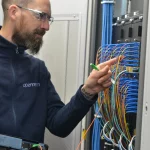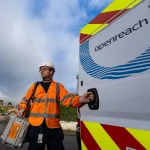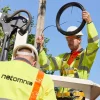AllPoints Fibre CEO on Becoming the UBER of the UK’s Full Fibre Wholesale Market

The CEO of alternative network operator AllPoints Fibre (APFN / Fern Trading), Jarlath Finnegan, has today told ISPreview – in a new interview – of his ambition for the company to become the “UBER of the full fibre wholesale market“, which reflects their desire to help “accelerate” the delivery of related UK broadband services over the next few years.
In case anybody has forgotten, AllPoints Fibre Networks was officially formed between 2023 and 2024 from the consolidation of three alternative broadband networks and ISPs (here and here), including Giganet, Swish Fibre and Jurassic Fibre. All of the companies were backed by Fern Trading and had previously been deploying FTTP networks to premises across different parts of the UK.
The consolidation occured against the backdrop of a market under growing strain from various challenges, such as rising build costs (inc. high interest rates), network overbuild and competition. Such strains had already put pressure on Fern’s various altnets and consolidation was seen as part of their strategy for creating a more efficient, flexible and diverse network.
Advertisement
The outcome saw APFN take on the role of a single national wholesale network for all of the aforementioned fibre operators, while UK ISP Cuckoo became the main outlet for all their retail customers. Since then APFN has also acquired another retail ISP in the shape of Glasgow-based full fibre ISP Brillband (here), which isn’t touched on in this interview because we conducted it just before that announcement.
However, just to be clear, while APFN has previously talked about harbouring post-consolidation plans to “accelerate full fibre delivery over the next five years”. Jarlath makes clear that the focus here is no longer on driving new network build. Instead, the operator is developing a wholesale offering that has a wider reach, which includes onboarding new networks and providing ISPs with access to operators that were once rivals (e.g. Openreach, CityFibre etc.).
“Think of us as the UBER of the full fibre wholesale market,” said Jarlath. “We are absolutely pushing to accelerate full fibre delivery. But this is not a build strategy: we are a wholesaler offering amazing service experiences to our customers.”
In the following interview, Jarlath also remarks that it would be “crazy for the Government to use [gigabit broadband] vouchers in urban areas” (these are currently limited to rural areas), while also saying that he’s “broadly happy with the current [markets] regulatory framework and would like to see it maintained“. On top of that he calls for altnets to “avoid under-pricing full fibre into which billions has been invested in a dash for customer numbers.”
Advertisement
The APFN Interview
1. I think it’s fair to say that APFN has had a busy couple of years, not least with the effort to consolidate the full fibre broadband networks of Giganet, Jurassic Fibre, and Swish Fibre under a single infrastructure brand, while at the same time splitting the retail bases of those providers out to Cuckoo. Has this consolidation drive now fully completed, and what did you find to be the biggest challenge in the process?
Jarlath Finnegan said:
In February 2023 we began the journey to extract all the best parts of each of the individual investments and create our national full fibre platform ‘aquila’, but more about that later. We wanted to rip up the rule book in the way full fibre services are delivered across the UK without having to build or buy to every premise. Think of us as the UBER of the full fibre wholesale market. We strongly believe the best way to challenge the market is to prove that our platform delivers, so we needed a customer with the same mindset and who better to work with initially than Cuckoo, who deliver fast, fair, feel-good broadband.
APFN is now supporting Cuckoo in their migration off legacy brands and networks, and they will be one of the first customers to benefit from the APFN aquila platform. We’re really excited to onboard further ISPs and Partners in the coming months who will have the advantage of our disruptive, seamless platform.
2. Prior to the consolidation, we had an incomplete idea of how much network coverage had been delivered by the aforementioned networks (premises passed / RFS) or how many customers they’d managed to acquire. Are you now in a position to share such details?
Jarlath Finnegan said:
aquila is network agnostic and currently offers access to 18m homes. This is increasing each quarter as our network partners continue to deliver new homes and business. We have also lit up and cut over onto our aquila national backbone network which we know is currently the fastest, most resilient way to traverse the UK. Our aquila edge network deployment is underway which means we will deliver amazing service experiences every time. We’re confident that the experience we’ll provide isn’t just better than our competitors; it’s unique.
3. APFN has previously indicated that, with the consolidation out of the way, they would push to “accelerate full fibre delivery over the next five years”. But the current environment has proven to be extremely challenging for many alternative networks, due to high build costs, strong competition and the difficulties of trying to raise fresh investment during a period of high interest rates.
Sadly, challenges like this have caused some operators to make redundancies and scale-back their network builds, which is something that we recall has affected APFN’s networks in the recent past too. Given all of this, can you possibly offer a bit more detail about what APFN’s actual network roll-out plans are for the next year or so, or is the strategy now one that is more focused upon growing customer take-up (commercialisation)?
Advertisement
Jarlath Finnegan said:
We are absolutely pushing to accelerate full fibre delivery. But this is not a build strategy: we are a wholesaler offering amazing service experiences to our customers. Our strategy to develop aquila was based on the needs of B2C and B2B ISPs. We aim to raise the standard in the market in partnership with our network partners CityFibre and Openreach, and our own APFN network. We have also made aquila network agnostic, so this allows us to get to an individual premise in the most cost-effective way and so we continue to assess the market opportunities. Enabling our customers to increase take up with the lowest cost to serve is where our focus is.
We work, day in day out, with our partners (which includes our own APFN network team) to push the boundaries of what is possible in this area as we believe in competition which will ultimately benefit the consumer. However, we do not support excessive overbuild as it’s a poor use of capital and will impact the attractiveness of the sector.
4. In a climate where consolidation seems to have become the talk of the town. Does APFN see itself more as being an attractive prospect for being consolidated by a bigger fish, or are you likely to focus on remaining independent, while potentially raising fresh investment as interest rates come down – perhaps even doing a little consolidation of your own?
Jarlath Finnegan said:
It’s clear the market will consolidate but there will be different levels on how this happens across assets and customers. It’s inevitable that some of the fibre investments that have been made will fail, but we have seen some good examples of what is possible. For example, I was interested to see the announcement of the recent CityFibre / Lit Fibre deal, with the ISP going back to the founders. This is really good business for all, including the end consumer. We will always be active in the market but like aquila it must be something different with realistic expectations. This is a long but exciting game!
5. The country recently welcomed a new government, which over the past few months has been sending some mixed signals. On the one hand we’ve seen various tax rises in the budget (increasing costs in certain areas), while on the other there’s been talk about making a “renewed push to fulfil the ambition of full gigabit and national 5G coverage by 2030” and unblocking planning.
How do you think the new government is doing, with respect to supporting altnets like APFN on this front, and what more would you like to see them do?
Jarlath Finnegan said:
When a government wins a landslide, expectations are always high across the board that they will bring in sweeping positive change, for everyone. And of course, we know that, with every decision a government makes, there must be winners and losers. The recent budget is certainly a case in point in that regard.
We will always want the government to do more but at the end of the day it’s business that creates jobs and wealth, so we must get on with it and they can hopefully support us. But we will always need to move first.
We have been talking about 5G for a long time now and when you compare it to the fibre roll out it hasn’t kept up. In the early stages of the fibre rollout, the industry set to work and just got on with the task in hand of building out, but we are not done yet and now we need to push for ubiquitous coverage which will need both fixed and wireless over the next 7 to 10 years along with government support to ensure the digital economy can thrive. Look at what we have achieved in 5 years!
Please flick over to Page 2 in order to finish reading the interview.
Mark is a professional technology writer, IT consultant and computer engineer from Dorset (England), he also founded ISPreview in 1999 and enjoys analysing the latest telecoms and broadband developments. Find me on X (Twitter), Mastodon, Facebook, BlueSky, Threads.net and Linkedin.
« Starlink 2024 Report Details 1Tbps Speed LEO v3 Broadband Satellites
Openreach Builds FTTP Broadband to 17 Million UK Premises »





















































Nice one on the interview.
Unfortunately, despite the optimism displayed here, as a long time Jurassic Fibre / Cuckoo customer, the only development I’ve seen since signing up is a reduction in customer service quality, the offloading of the fibre installations to contractors, and the addition of the name Cuckoo to the bill.
IPv6 is still very much an opt-in, IPv4 is still CGNAT by default, the Jurassic Fibre network is still GPON, you can’t take up any of the consolidated company’s packages via Cuckoo so if you go to Cuckoo website and search for a broadband package you’ll be told you’re not covered, you’ve got to go to Jurassic Fibre itself which is surely confusing and losing customers when they can’t take up a service via the advertised brand…
Only reason I’m still a customer is the higher upload vs Openreach packages, but with Openreach set to start launching symmetric… Cuckoo need to do something or they’ll start to lose their top paying customers to offerings with better speeds.
TBF Openreach use contractors to do many of their installs (MJ Quinn in my area, they have used Kellys in the past).
So they have 300k of their own build opened up for wholesale, plus they sell access to CityFibre and Openreach. Quite why you’d need to pay (what I imagine is a substantial fee to APFN) to wholesale off of Openreach and CityFibre is beyond me when it is reasonably simple to do yourself. I predict nobody serious will put any kind of scale over their platform. Yet another colossal waste of money
Indeed this is only attractive to those who can’t even put say two thousand customers on each. I guess for small IT companies and stuff?
I assume their intention is to sign deals with the mid-sized AltNets (Netomnia, F&W, etc.) so that customers can access a significant number of networks under one contract with APFN. How successful this approach will be remains to be seen, of course.
He’s setting up shop to win business from virtual/networkless ISPs and give them instant national coverage – something their main rival BTW struggles with because they only use Openreach.
If there’s an alternative to building any rational ISP will take it. Build is last resort because of payback times. Leasing is instant margin.
“My advice to altnets is to avoid under-pricing full fibre…”
Oh OK, not sure that’s what the consumers want to hear, let’s keep the prices high, let’s not have a competitive market.
Is Mr Finnegan frightened of competition?
Have you seen the cost of 500 meg broadband in other western countries, UK altnets are killing each other, it’s a great service when you have it but surely it takes more than 30 pounds a month to run it.
No, he’s concerned about a prolonged battle of attrition which will replicate the cable wars and mergers and result in one, maybe two, providers with higher prices.
Those with skin in the game though are losing sleep over not being able to make their interest payments and will sell at almost any price to raise a contribution to covering those costs.
It doesn’t really cost any more to provide a 500M service than a 50M service. It’s all in the capital cost and the customer support/billing.
Most people would be perfectly happy with 50M anyway, which means altnets have to undercut on price to pick up customers. The higher speed claims may pick up a few customers who were worried about leaving their existing trusted ISP, and/or some techno nerds.
But Openreach FTTP has 50% UK coverage already, growing at about 1% per month, and is introducing symmetric tiers from April: so the time that the altnets can claim to be “better” is rapidly running out. That leaves only price to compete on, and then it’s a race to the bottom, where customer service becomes a cost to be slashed.
> introducing symmetric tiers from April
A single symmetric tier which (probably!) won’t be available nationally.
If you can’t stand the heat, get out of the kitchen.
Don’t ask others to keep prices artificially inflated just because you can’t run a competitive, profitable business.
It’s not up to consumers to prop up poor business planning.
AP (Swish) went live in our street about a year ago, 2 1/2 years behind Openreach. So far they have managed to get 2 customers vs 32 for Openreach, also VMO2 are supposed to be building as well. It seems to me that any altnet coming in behind the established players is going to struggle to get a viable level of uptake.
A lot of the problem is because people don’t want to leave who they have been with for years, I have heard it time and time again, I trust BT, I don’t want my service with anyone else but BT. Stick Sky, Talk Talk or any other large company you can think of in BT place.
That is the problem, people are scared to move network, yes I know if they move from FTTC to FTTP they are moving network, but you know what I mean
This is where Openreach has the unfair advantage.
I would have stayed on FTTC if Plusnet did not force the issue, they lost out in the end as I went for an altnet. I don’t believe in this company loyalty thing, I go to who offer me the service for the best price, admittedly I have stuck with some companies, like the ones I get my coffee from and the one I get my ink from
How have you managed to make Openreach’s CP customers (Sky, TalkTalk etc.) not wanting to offer their services over an altnet fibre network an issue of unfair advantage?
A wholesaler with a tiny footprint? How does that work exactly? They either need to gobble up other altnets or wait to be gobbled up and the Cuckoo brand is the only thing that survives.
Ah good old APFN. The company that did an absolutely s**t job of installing fibre in Winchester after much fanfare. Apart from the easiest properties, they excluded streets (completely or partially) that would have required a bit of extra spending.
Do it properly or don’t bother at all. Uber of the full fibre market. Give me a break.
It sounds very like what Fibre Cafe is/is trying to be, would be interesting to hear if Jarlath sees if differently to that or whether he feels there’s room for more than one of these aggregators.
Not quite. Fibre Cafe is an API gateway. It’s like Google translate between various network provider’s APIs and offers a consistent & abstracted API endpoint to transaction over multiple carriers.
Means that if I wish to sell over CFH, CFL, OR, BTW, PXC, Netomnia, etc, I just need to develop one set of APIs for provision, modify, cease, amend, diagnose, serviceability. I don’t have to develop 6 different version for each provider.
Fibre Cafe don’t operate a network, so they don’t do any interconnections, backhaul, core, transit, core ISP stuff like BNGs, and RADIUS auth etc.
Fibre Cafe is not a competitor in this instance, they are an enabler at the serviceability, service order management and diagnostic API level.
There’s still a requirement to build a national network, interconnect with all the carriers at the lowest cost, and then run all the core ISP stuff.
I have to admit it sounds like a similar approach to PlatformX, but less evolved… I’m sure smaller retail ISPs would appreciate an easier way to wholesale their services (1 agreement in total is easier than 1 for OR, CF, Nexfibre etc.) but the challenge of network build standards remain, so small ISPs would still need to manage multiple products on XGS Vs GPON Vs HFC.
Becoming the uber of full fibre wholesale market? Seriously? For a second just think about it logically
I realise any consolidation can be a rocky journey for company, employees, customers alike – but I joined Giganet when it was new, and good – could speak to staff, get issues resolved quickly (just one, they were super), good price/service.
Things went downhill – part of that being growth, but then poorer routing, removal of some services, moving to cgnat. I left – and even that process was broken. Still no refund for minor overpayment after 4 months. Utter incompetence
I suspect the end result maybe something stronger. stronger to sell off I presume…
Frankly, All Points Fibre need to get their finger out if they want to compete with other fibre network operators. Giganet have been rolling out in our area (Tadley) for years yet they still only serve a small area.
In contrast to that, in the space of six months we’ve had Nexfibre rock up, lay their own ducts and fibre, and go live with Virgin Media in much of the town and surrounding areas. On top of that both Trooli and Cityfibre have been carrying out works in our area.
We pre-registered with Giganet several years ago and if you believe their web site, it’s still coming to our address… if All Points Fibre ever finish the rollout here. Last year I emailed All Points Fibre to ask what was happening and they were less than helpful.